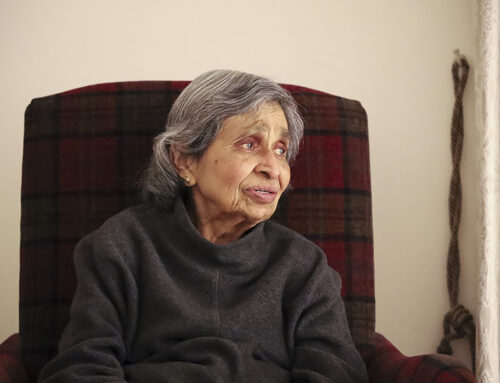In keeping with SAMHIN’s mission of greater dialogue on mental health in the South Asian community and to highlight the important work of others in this area, we invited Anju Puri, a SAMHIN volunteer who is committed to helping others, to tell us how a grief journey can be deeply personal.
Grief is a topic that is not commonly discussed in our society. There is a stigma associated with it in American society as the mentality is to “suck it up” and move on with your life. The danger lies when emotions and feelings are not acknowledged and people start to shut down themselves and their loved ones.
As a South Asian woman, I grew up with a large circle of families around me and saw grief bring people together. As a child, I recall the deep connections and support from loved ones during the grieving period. Ironically, this was my only perception of how grieving families looked from the surface. My personal journey of grief left a “deep hole” inside of me. Unfortunately, I experienced some cultural awakenings in this phase. I knew what it meant to keep your cup full before you pour out and give to others. I took a leap forward in supporting myself emotionally and seeking the necessary support during a difficult time. I am thankful for some of my close friends and co-workers who were part of my journey along with a team of medical professionals.
Through several self-reflections, I have learned more about myself. I am very emotionally sensitive, which is not my weakness but my greatest strength. I see myself as someone who is empathetic and can sense other people’s energy. I want to provide a support system for all. As I got closer to my self-discovery, better and newer possibilities started to show up in my own life. I found my life’s “meaning”!
As a women’s coach, I started to inquire more about why people choose to stay in denial or deal with loss in silence. The more I spoke about this, the more I was driven to educate myself on the topic and help grieving families.
Below is an overview of the original five stages of grief (as defined by Elizabeth Kubler Ross), and then an introduction to the sixth stage (as introduced by David Kessler who I have been deeply inspired by and continue to learn from).
- Denial: initial shock
- Anger: blame toward others
- Bargaining: a form of a false hope that leads to guilt
- Depression: pure sadness and withdrawal from life
- Acceptance: learn to live with the loss
- Finding Meaning: learning to remember those who have died with more love than pain and learning to move forward in a way that honors our loved ones
Do a self-assessment and see “how you are really doing”. Acknowledge your journey and your emotions along the way. My two cents are not to suppress but express all your deep emotions. Expression and sharing can ease your burden.
By Anju Puri
Transformation & Life-Purpose Coach
Corporate Trainer, Learning Tree International
SAMHIN volunteer
I invite your comments. I would love to hear about your grief journey.
Subscribe to SAMHIN blog to be notified when the next post is published.
Featured image by Anju Puri







Anju, your blog article on emotions about grief is well-articulated. I understand these emotions firsthand as I have recently lost my husband. The support of immediate families and friends does help short term, but the conversations are more about accepting the inevitable that all human beings have to die, be strong, go to the temple, etc., and try to move on. Serious mental issues must be addressed promptly to avoid any long-term effects. Getting mental health support from experienced professionals is very important when needed.